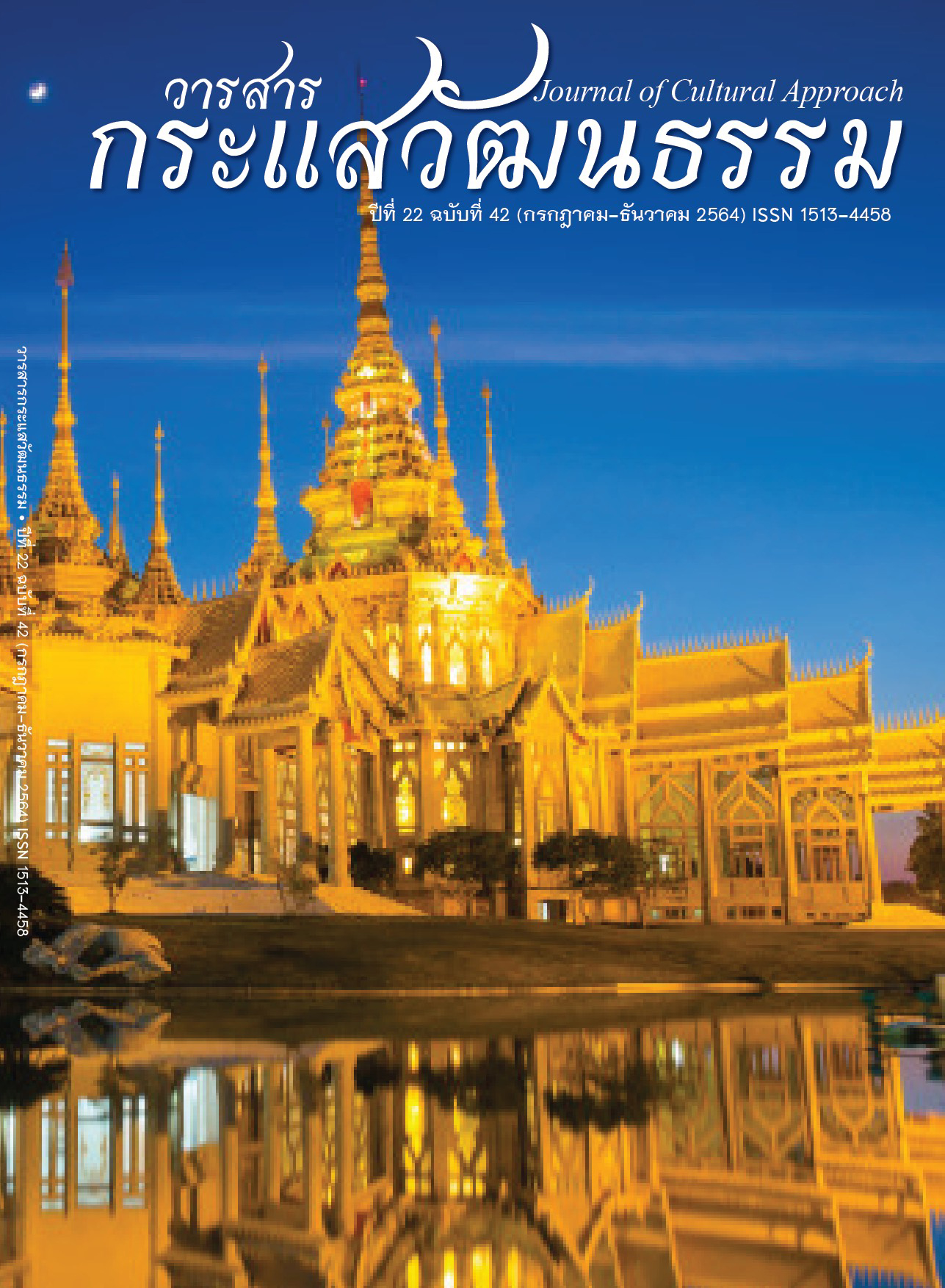The Value Creation Model of Southern Shadow Play According to the Philosophy of Sufficiency Economy
Main Article Content
Abstract
The objectives of the research were: 1) to study the value-added management context and southern shadow play value; 2) to develop the management model to increase the value of the southern shadow play according to the Philosophy of Sufficiency Economy, and 3) to evaluate the effectiveness of value-added management model and the value of the shadow play of the southern region according to the Philosophy of Sufficiency Economy by using the research and development model. The areas of research were Nakhon Si Thammarat, Songkhla, and Phatthalung provinces. The population and sample groups were 7 experts, 15 scholars, 21 shadow players, 54 audience representatives, and 30 effectiveness evaluators. Research tools were synthesis questionnaires and data collection form by the synthesis of documents and research, interviewing, focus group, and examining the comment. Data analysis was content analysis. The statistics used were percentage, mean, standard deviation, and the consistency index (IOC).
The results showed that 1) concerning the context of value-added and value-added management in the southern shadow play, it was found that the knowledge element focused on development in various ways, such as the transfer of the inheritance of the performing techniques, and knowledge management. 2) Concerning the results of the questionnaire analysis from academic sample groups, the audience, and the related parties, it was found that the show had to proceed fast. The manipulation of puppets and playing with shadows were necessary, and country songs should be used as background music. 3) Concerning the production of shadow play, scholars, the audience, and related parties agreed that the stamping and carving of the patterns must be delicately detailed, and bright colors should be used according to traditional beliefs. But the dress style may develop according to the era. 4) Concerning marketing strategy, adding value, and creating heirs, public relation media should be used on the Internet, presenting more funny performances, and the performances should be performed at the shopping centers and in the educational institutions, as well as creating short-term shadow play teaching courses for interested in groups, and increasing more sales sources or sales channels for a souvenir.
Article Details

This work is licensed under a Creative Commons Attribution-NonCommercial-NoDerivatives 4.0 International License.
Proposed Creative Commons Copyright Notices
1. Proposed Policy for Journals That Offer Open Access
Authors who publish with this journal agree to the following terms:
- Authors retain copyright and grant the journal right of first publication with the work simultaneously licensed under a Creative Commons Attribution License that allows others to share the work with an acknowledgement of the work's authorship and initial publication in this journal.
- Authors are able to enter into separate, additional contractual arrangements for the non-exclusive distribution of the journal's published version of the work (e.g., post it to an institutional repository or publish it in a book), with an acknowledgement of its initial publication in this journal.
- Authors are permitted and encouraged to post their work online (e.g., in institutional repositories or on their website) prior to and during the submission process, as it can lead to productive exchanges, as well as earlier and greater citation of published work (See The Effect of Open Access).
Proposed Policy for Journals That Offer Delayed Open Access
Authors who publish with this journal agree to the following terms:
- Authors retain copyright and grant the journal right of first publication, with the work [SPECIFY PERIOD OF TIME] after publication simultaneously licensed under a Creative Commons Attribution License that allows others to share the work with an acknowledgement of the work's authorship and initial publication in this journal.
- Authors are able to enter into separate, additional contractual arrangements for the non-exclusive distribution of the journal's published version of the work (e.g., post it to an institutional repository or publish it in a book), with an acknowledgement of its initial publication in this journal.
- Authors are permitted and encouraged to post their work online (e.g., in institutional repositories or on their website) prior to and during the submission process, as it can lead to productive exchanges, as well as earlier and greater citation of published work (See The Effect of Open Access).
References
Chanthawongphaisan, P. (2012). Contemporary Chinese Art One Century from the Past to the Present. Journal of Fine Arts, 3(1), 121–123.
Chartrungruang, B. (2010). Application of the Royal Initiative of Sufficiency Economy to Inherit Local Wisdom. Department of Fine Arts, Faculty of Humanities and Social Sciences, Chiang Mai Rajabhat University.
Charoenrath, O. (2008). Father’s Teaching Words: Royal Speeches about the Sufficiency. Bangkok: Phra Dabot Foundation.
Isarangkun Na Ayuthaya, C. & Piboonsarawut, P. (2010). Following the Father’s Footsteps of Sufficient Life…to Sustainable Development. Bangkok: the Crown Property Bureau.
Kongkhum, S. & Sungrugsa, N. (2015). The Development of Knowledge Management Model for Shadow Puppet (Nang Talung) Local Wisdom to Strengthen Local Culture. Silpakorn Educational Research Journal, 7(1), 242–255.
Noothong, U. (1988). Music and Folk Play of the South. Faculty of Humanities, Srinakharinwirot University, Songkhla Campus.
Office of the National Economic and Social Development. (2010). Application of Sufficiency Economy Principles. Bangkok: Sahamit Printing and Publishing Company Limited.
Promtape, O. (2010). Learning of Shadow Players for Their Existence of Shadow Plays in Modern Society. Princess of Naradhiwas University Journal, 2(1), 41–56.
Sukarakan, C. (2016). Wat Phra Maha That Woramahawihan, Nakhon Si Thammarat Province, and Nomination for the World Heritage Site. Silpakorn Journal, 59(5), 5-13.
Sumetheeprasit, C. (2012). Risk Management (Value Creation No. 335). Retrieved from http://chirapon.wordpress.com
Thongsanay, M., Vuthi, A., Idthirattanasoontorn, P. & Thongpuang, P. (2015). The Development of Information System for Knowledge Management on Regenerating Shadow Play, the Southern Folk Wisdom. Rajamangala University of Technology Rattanakosin.
Vatviroj, S. (2016). Factors of Inheritance and Change in Folk Media: A Case Study of Tepsil Pongkeaw Shadow Puppets Show, Master of Trilingual Shadow Puppets. Journal of Management Sciences, 3(1), 173–191.


